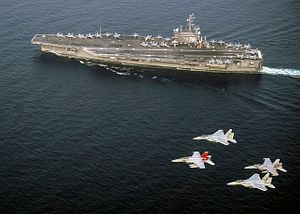Numerous dialogues are currently underway regarding plans for developing an order in the Eurasia and Asia-Pacific regions. Multiple ideas and frameworks are also being proposed, including China’s One Belt, One Road plan and the Free and Open Indo-Pacific concept backed by countries including Japan, the United States, Australia and India. To a large extent, these frameworks rest on the assumption of confrontation between the new order that China is attempting to build and the current order supported by countries centered on Japan and the United States.
Recently, Japanese politicians have begun suggesting that the Free and Open Indo-Pacific concept is not mutually exclusive with the One Belt, One Road plan, and that there could be a cooperative relationship between the two. Still, the relationship between them remains tense and confrontational.
The question is how to put these plans for building an order into action. The important aspect in this sense is how Japan, the United States and China should go about establishing an order. Not surprisingly, winning the understanding of the countries of the Asia-Pacific region is the key to these efforts. This is a highly diverse region, with countries ranging from emerging powers that belong to the Group of Twenty to others with per capita incomes of less than $1,000. In terms of political systems, there are both democracies and authoritarian regimes. How could any one order be agreeable for all of them? Yet conceiving such an order is the task that confronts the key players.
In that respect, what China offers is attractive to the region. Beijing attaches no conditions associated with democracy and human rights to its assistance. That assistance is generous, and the procedures are straightforward. New power relationships proposed by China are win-win relationships and partnerships based solely on economic ties.
In contrast, the Free and Open Indo-Pacific concept sets higher hurdles. Yet observers point out that countries that receive Chinese assistance often face a financial crisis as a result of the excessive lending by China. They become unable to repay their loans, and have been forced to offer China security of some kind. Sri Lanka is a case in point. Other observers note that authoritarian regimes are taking advantage of global positioning systems (GPS) and monitoring systems offered by China to strengthen their own oppression.
The positions and awareness of countries in the Indo-Pacific are factors that will determine the image of any regional order. For this reason, Japan, the United States, Australia and India, which are advancing the Free and Open Indo-Pacific concept, and China, which is proceeding with the One Belt, One Road plan, need to remain close to the countries of the region. The question of how to maintain close ties with authoritarian regimes is a difficult one, however. The United States retains an unyielding position on authoritarian nations, while Japan adopts a somewhat softer stance. However, will staying close produce results in terms of building an order?
That is unlikely, in my view. Rather, I would suggest that those countries behind the Free and Open Indo-Pacific concept actively support the democratic nations that support the concept and assist liberals in those countries that at least retain democracy as a system, even if in weakened form. As for those countries under authoritarian regimes, outreach to which has produced no visible effect, assistance can be dramatically curtailed, accepting their total commitment to China and waiting for these countries to discover for themselves the problems inherent in that approach.
In any event, merely calling for correctness is meaningless. To build an order, what is needed is the discipline to avoid getting too close to authoritarian regions, together with the imagination to understand the positions of those countries that do accept Chinese assistance.
Shin Kawashima is a professor at the University of Tokyo.

































